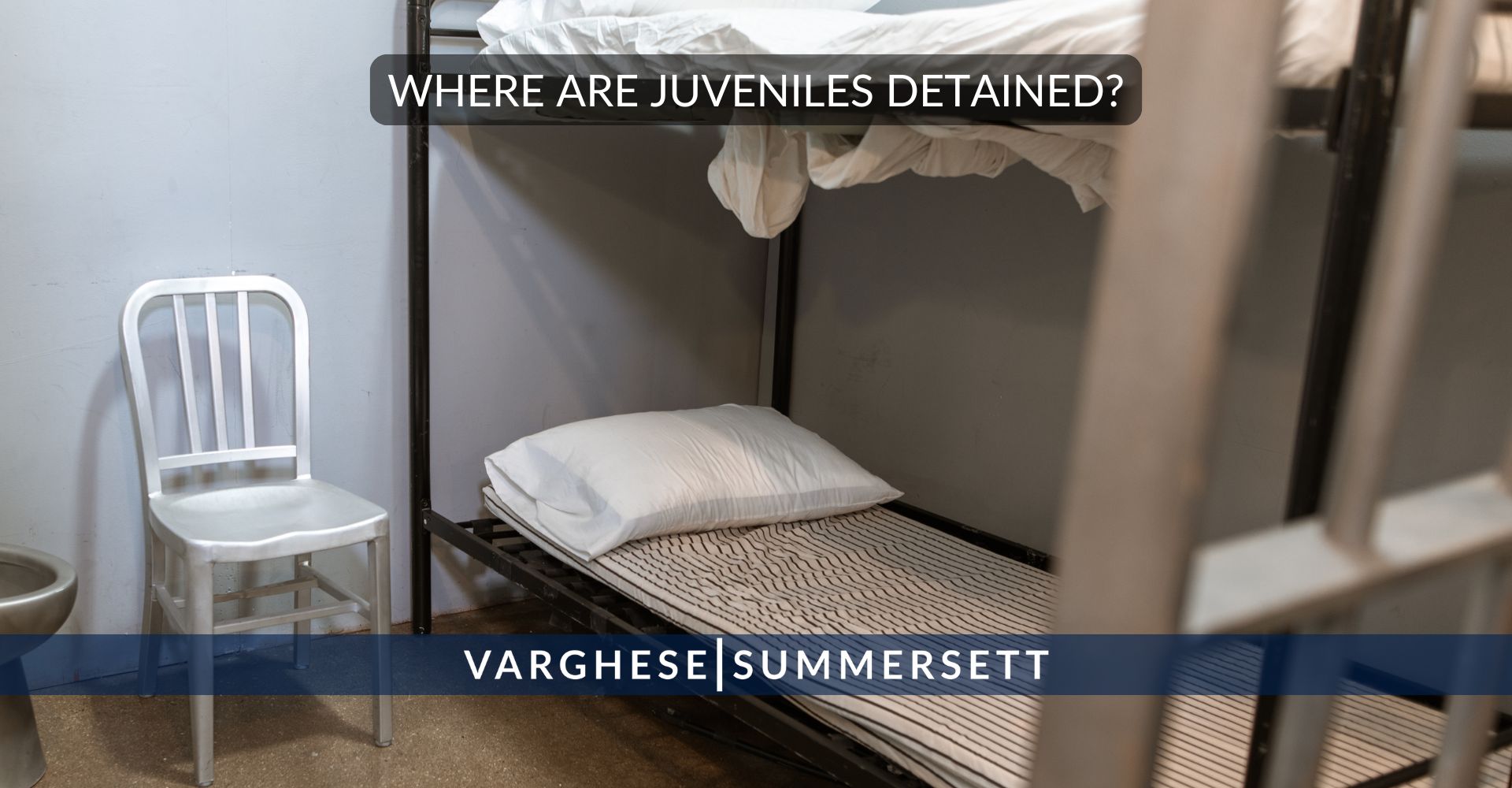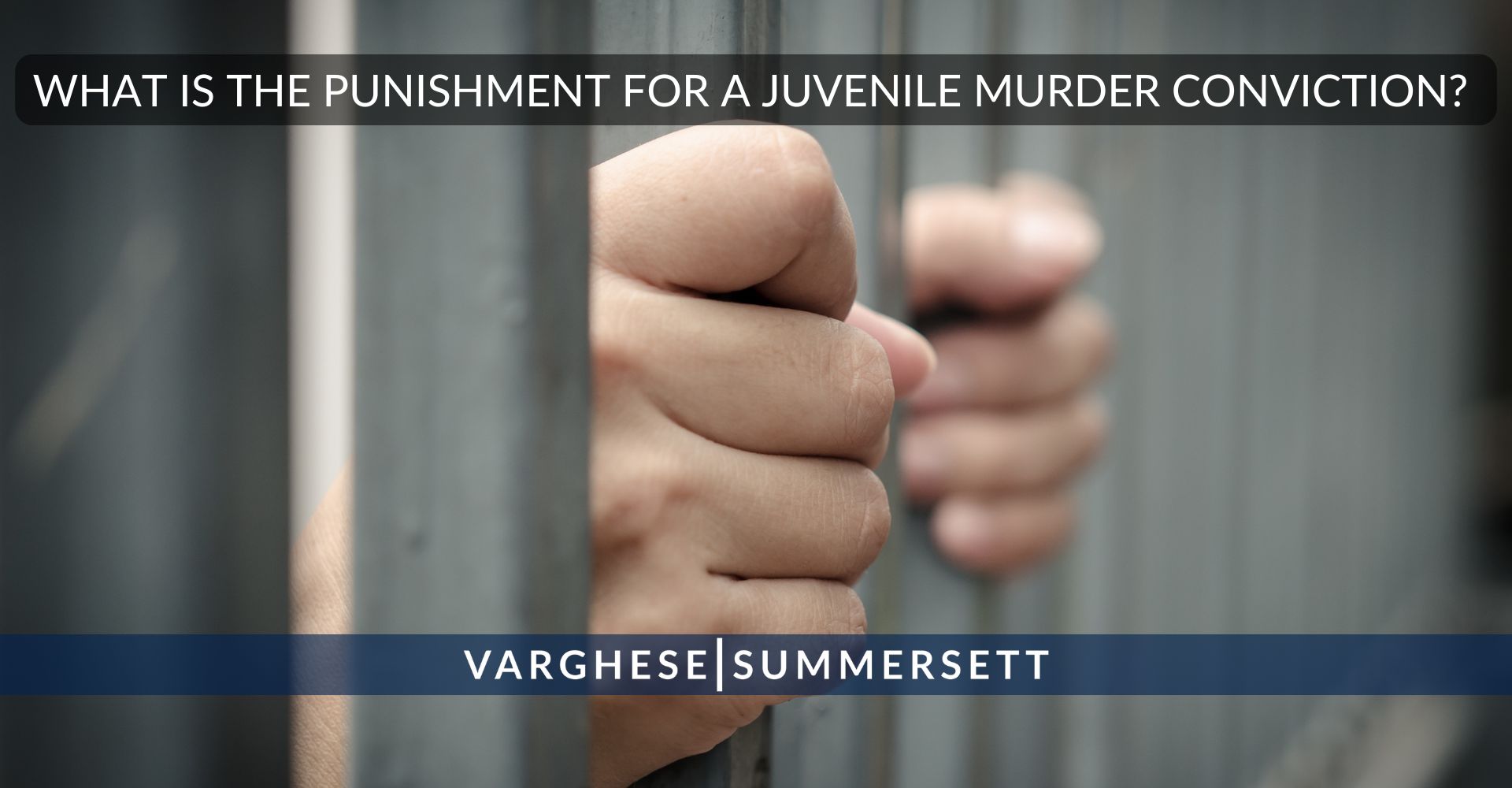If your child is facing a juvenile murder charge in Texas, the most important thing you can do is contact a highly-experienced juvenile defense attorney as soon as possible. Time is of the essence; things move faster for juveniles than adults.
At Varghese Summersett, we are fortunate to have two seasoned juvenile attorneys on our team. Lisa Herrick is Board Certified in Juvenile Law – one of only two attorneys in Tarrant County and only 70 in the entire state to hold this prestigious distinction. Mike Hanson is a former prosecutor who is skilled at defending juveniles accused of serious crimes, including murder, and has a strong track record of success in the Houston area.
In this article, we explain juvenile murder charges in Texas, the legal process from arrest to defense, possible punishments, and common defense strategies.
Who is Considered a Juvenile in Texas?
In Texas, a person is considered a juvenile if they are between the ages of 10 and 17 at the time the alleged offense occurred. Children younger than 10 cannot be prosecuted for criminal conduct. Once a person turns 17, they are considered an adult in the Texas criminal justice system.
Juvenile cases follow a different process than adult criminal cases. The goal is often rehabilitation, but when the accusation is serious — such as juvenile murder charge — the stakes are extremely high and the process can become more adversarial and complex.

What Happens When a Juvenile is Arrested for Murder?
Juveniles accused of murder in Texas are taken to a juvenile detention center, not an adult jail. From there, the legal process moves quickly:
- A detention hearing will be held within 48 business hours to determine whether the juvenile will remain in custody. Learn more about juvenile detention hearings.
- Filing of a petition, which is the juvenile equivalent of an indictment.
- Possible certification hearing if the state seeks to try the juvenile as an adult. Learn more about juvenile certification.
- Adjudication hearing (trial before a judge) and, if adjudicated delinquent, a disposition hearing to determine punishment. Learn more about adjudication hearings.
Our attorneys are skilled at every step of the juvenile process and will challenge the state’s case at every opportunity, advocating for the child’s rights, freedom and future.

Where Are Juveniles Detained in Texas?
Juveniles charged with murder in Texas are held in secure county-run detention facilities. Examples include:
- Tarrant County Juvenile Services Center – Fort Worth
- Harris County Juvenile Detention Center – Houston
- Dallas County Henry Wade Juvenile Justice Center
- Collin County Juvenile Detention Center
These facilities are locked, high-security centers. Access is restricted, and juveniles are closely monitored. Our attorneys work to get juveniles out of detention when possible or seek placement at home or more favorable settings.
What Constitutes Murder in Texas?
Under Texas Penal Code § 19.02, a person commits murder if he or she:
- Intentionally or knowingly causes the death of another person;
- Intends to cause serious bodily injury and committs an act clearly dangerous to human life that causes death; or
- Causes the death of a person during the commission or attempted commission of a felony (other than manslaughter) — commonly referred to as felony murder.
With juvenile murder charges, intent is often a key point of contention. Attorneys must carefully evaluate whether a juvenile understood the consequences of their actions or acted under pressure, confusion, or in a chaotic situation.
Can a Juvenile Be Tried as an Adult for Murder in Texas?
Yes. Texas law allows for juveniles aged 14 to 17 to be certified as adults and tried in adult criminal court for first-degree felonies, including juvenile murder charges. This occurs through a certification hearing where a juvenile court judge determines whether the case should be transferred to the adult system. The judge will consider:
- The severity of the alleged offense;
- The juvenile’s maturity and mental development;
- Past criminal or behavioral history;
- The likelihood of rehabilitation within the juvenile system.
If certified as an adult, the juvenile will be prosecuted in adult court and face adult sentencing, which for murder carries a punishment range from 5 years to life in prison. Both Lisa Herrick and Mike Hanson have successfully defended against certification, keeping juveniles in the more rehabilitative juvenile system. Learn more about the juvenile certification process in Texas.
What is the Punishment for Juvenile Murder?
The punishment for a juvenile found delinquent (the juvenile equivalent of “guilty”) of murder in Texas depends on whether the case remains in juvenile court or is transferred to adult court.
If Tried in Juvenile Court
Determinate Sentence: Up to 40 Years
For serious felony offenses like murder, a juvenile court may impose a determinate sentence under Texas Family Code § 53.045. A determinate sentence is a fixed term of incarceration or probation, rather than an open-ended sentence based on rehabilitation progress.
Determinate sentencing is used for serious, violent, or repeat offenders and is only available for specific felony offenses including murder, aggravated robbery, aggravated sexual assault, injury to a child, elderly individual, or disabled person, criminal solicitation, arson causing bodily injury or death.
For a juvenile murder charge, the maximum determinate sentence is 40 years. A juvenile adjudicated for murder will begin serving their sentence in the Texas Juvenile Justice Department (TJJD), the state’s secure juvenile facility system, and could later be transferred to adult prison.
Example: If a 16-year-old is adjudicated for murder and receives a 20-year determinate sentence, they will begin their sentence at a TJJD facility. Before their 19th birthday, a transfer hearing will be held to determine whether:
- The youth should be transferred to the Texas Department of Criminal Justice (TDCJ) to serve the remainder of their sentence in adult prison and would be subject to adult parole eligibility rules; or
- The youth should be discharged and placed on parole or community supervision.
A determinate sentence allows the state to maintain control over the juvenile beyond their 19th birthday, if needed. Despite this, the juvenile retains more opportunities for treatment, parole, and rehabilitation than they would in the adult system.
Indeterminate Sentence: Up to Age 19 Based on Rehabilitation
While less common in murder cases, a juvenile adjudicated for murder may receive an indeterminate sentence under certain circumstances — particularly if prosecutors opt not to seek a determinate sentence. An indeterminate sentence does not include a fixed term. Instead, the Texas Juvenile Justice Department (TJJD) determines how long the juvenile remains in custody, based on:
- Progress in treatment programs
- Institutional behavior
- Risk of reoffending
- Efforts at rehabilitation
Juveniles may have their indeterminate sentence modified or terminated based on their continued efforts towards rehabilitation. This provides a sense of hope and motivation for juveniles to turn their lives around and work towards becoming productive, law-abiding adults.
Important Age Limits in an Indeterminate Sentence
- If the court places the juvenile on probation instead of sending them to TJJD, that probation must end by their 18th birthday.
- A juvenile cannot stay in TJJD after turning 19. Regardless of progress or the seriousness of the offense, they must be released by their 19th birthday.
- If the juvenile is released on parole, that supervision must end by their 19th birthday.
- After these age limits are reached, the court and TJJD lose all authority over the juvenile. The case is considered closed, and no further supervision is allowed.
Indeterminate sentences are generally used for less serious offenses. In murder cases, prosecutors usually pursue a determinate sentence to give the court more long-term control over the youth. However, under specific circumstances, an indeterminate sentence may still be imposed if the state believes the juvenile can be rehabilitated within the juvenile system.
Learn more about determinate and indeterminate sentences.
If Tried in Adult Court: Up to Life in Prison
If a juvenile is certified to stand trial as an adult, the case is transferred from juvenile court to adult criminal court, where the rules and punishments mirror those applied to adult defendants.
Murder in Texas is classified as a first-degree felony, and the punishment range is 5 to 99 years or life in prison and a maximum $10,000 fine.
Before a juvenile can be tried in adult court, the prosecution must request a certification hearing, where the juvenile court judge considers multiple factors, including:
- The seriousness of the offense;
- The child’s age, maturity, and sophistication;
- The child’s criminal or behavioral history;
- Whether the juvenile justice system can adequately rehabilitate the child before their 19th birthday.
If the judge grants certification, the juvenile is transferred to adult court and faces full exposure to adult sentencing. This is a critical turning point in any juvenile murder case.

Why the Filing Decision Matters
The decision to seek adult certification drastically alters the outcome potential. A juvenile in adult court faces far more severe punishment and a criminal record that follows them for life. By contrast, juvenile court proceedings are more focused on rehabilitation and privacy, with options like determinate sentencing and treatment-based interventions.
That’s why our attorneys — including Board Certified Juvenile Attorney Lisa Herrick and Senior Counsel Mike Hanson — act immediately to contest certification and work toward resolution within the juvenile system whenever possible.
Understanding whether a juvenile murder case stays in juvenile court or moves to adult court is one of the most important strategic decisions in a case. It can mean the difference between eventual rehabilitation or decades in adult prison.
Possible Defenses to Juvenile Murder Charges
Every juvenile murder charge presents its own unique facts, and effective defense strategies are rooted in detailed case review, expert consultation, and legal motion practice. Common defenses include:
- Lack of Intent: The juvenile did not intend to kill or did not understand the consequences.
- Self-Defense: The juvenile was protecting themselves or someone else.
- Alibi: The juvenile was not at the scene of the crime.
- Coercion or Duress: The juvenile was forced or pressured by others to act.
- Unlawful Interrogation: Juvenile statements were taken in violation of their rights.
Both Lisa Herrick and Mike Hanson are highly skilled at identifying and executing strategic defenses — often leveraging forensic experts, psychological evaluations, and legal motions to challenge the prosecution’s evidence.
Why Experience Matters
When your child is facing a juvenile murder charge, experience matters. Lisa Herrick is among a select group of attorneys in Texas who are Board Certified in Juvenile Law. She spent years as a juvenile prosecutor before becoming one of the most respected juvenile defense attorneys in North Texas.
Mike Hanson brings vast experience to our Houston practice. As a former prosecutor, Mike understands how to deconstruct the state’s case and present a powerful defense on behalf of young people. Both attorneys have handled high-profile juvenile murder cases and understand how to navigate the media, manage complex legal issues, and advocate aggressively for their clients in court.
Child Charged with Murder? Contact Us.
Juvenile murder charges require immediate, strategic, and aggressive legal action. At Varghese Summersett, defense attorneys Lisa Herrick and Mike Hanson stand ready to defend your child’s rights and future. Call Varghese Summersett at 817-203-2220. When the stakes are high, we leave nothing to chance.






